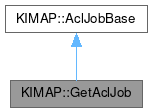KIMAP::GetAclJob
#include <getacljob.h>

Public Member Functions | |
| GetAclJob (Session *session) | |
| QMap< QByteArray, Acl::Rights > | allRights () const |
| bool | hasRightEnabled (const QByteArray &identifier, Acl::Right right) const |
| QList< QByteArray > | identifiers () const |
| Acl::Rights | rights (const QByteArray &identifier) const |
 Public Member Functions inherited from KIMAP::AclJobBase Public Member Functions inherited from KIMAP::AclJobBase | |
| AclJobBase (Session *session) | |
| QString | mailBox () const |
| void | setMailBox (const QString &mailBox) |
Protected Member Functions | |
| void | doStart () override |
| void | handleResponse (const Response &response) override |
 Protected Member Functions inherited from KIMAP::AclJobBase Protected Member Functions inherited from KIMAP::AclJobBase | |
| AclJobBase (JobPrivate &dd) | |
Additional Inherited Members | |
 Public Types inherited from KIMAP::AclJobBase Public Types inherited from KIMAP::AclJobBase | |
| enum | AclModifier { Add = 0 , Remove , Change } |
Detailed Description
Gets the ACL for a mailbox.
This job can only be run when the session is in the authenticated (or selected) state.
The user must have the Acl::Admin permission on the mailbox for this job to succeed (see MyRightsJob).
This job requires that the server supports the ACL capability, defined in RFC 4314.
The meaning of identifiers depends on the server implementation, with the following restrictions:
- "anyone" means any authenticated user, including anonymous
- an identifier starting with a minus sign ('-') indicates "negative rights": rights that should be taken away from matching users
Other than the above restrictions, ACL identifiers are usually IMAP usernames, but could potentially be group names as well.
Note that negative rights override positive rights: if "fred" and "-fred" are both assigned the 'w' right, the user "fred" will not have the 'w' right.
Definition at line 48 of file getacljob.h.
Constructor & Destructor Documentation
◆ GetAclJob()
|
explicit |
Definition at line 36 of file getacljob.cpp.
◆ ~GetAclJob()
|
override |
Definition at line 41 of file getacljob.cpp.
Member Function Documentation
◆ allRights()
|
nodiscard |
Gets the full access control list.
The result of this method is undefined if the job has not yet completed.
See the GetAclJob documentation for an explanation of identifiers; in particular, identifiers starting with '-' specify negative rights.
Definition at line 97 of file getacljob.cpp.
◆ doStart()
|
overrideprotected |
Definition at line 45 of file getacljob.cpp.
◆ handleResponse()
|
overrideprotected |
Definition at line 52 of file getacljob.cpp.
◆ hasRightEnabled()
|
nodiscard |
Check whether an identifier has a given right set.
The result of this method is undefined if the job has not yet completed.
See the GetAclJob documentation for an explanation of identifiers; in particular, identifiers starting with '-' specify negative rights.
Note that this will not tell you whether the net result of all the ACL entries means that a given user has a certain right.
- Parameters
-
identifier the identifier to check the rights for right the right to check for
Definition at line 76 of file getacljob.cpp.
◆ identifiers()
|
nodiscard |
The identifiers present in the ACL.
This method will return an empty list if the job has not yet been run.
See the GetAclJob documentation for an explanation of identifiers; in particular, identifiers starting with '-' specify negative rights.
Definition at line 70 of file getacljob.cpp.
◆ rights()
|
nodiscard |
Get the rights associated with an identifier.
The result of this method is undefined if the job has not yet completed.
See the GetAclJob documentation for an explanation of identifiers; in particular, identifiers starting with '-' specify negative rights.
Note that this will not tell you the rights that a given user will have once all the ACL entries have been taken into account.
- Parameters
-
identifier the identifier to check the rights for
Definition at line 87 of file getacljob.cpp.
The documentation for this class was generated from the following files:
Documentation copyright © 1996-2025 The KDE developers.
Generated on Fri May 2 2025 11:54:42 by doxygen 1.13.2 written by Dimitri van Heesch, © 1997-2006
KDE's Doxygen guidelines are available online.